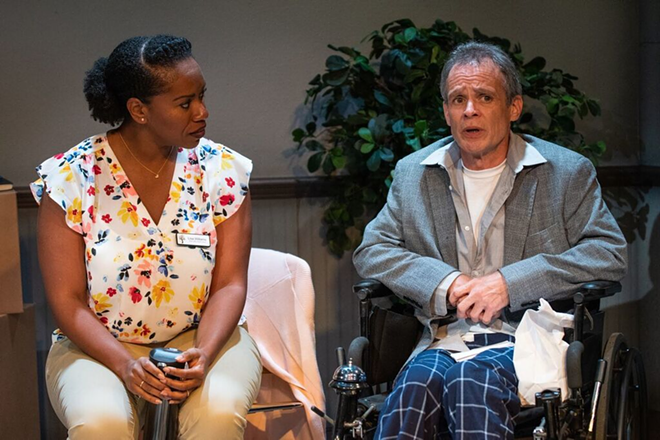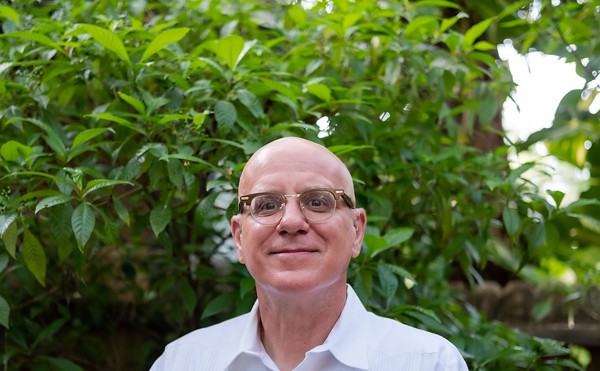Will Eno’s Wakey, Wakey, currently playing at Sarasota’s Urbanite Theatre, is more interesting than it is satisfying. This dramatization of a dying man’s last minutes wants to defeat our expectations of how a play ought to proceed while at the same time moving us to appreciate the miracle of existence. Problem is, that first impulse — to be anti-theatrical — keeps getting in the way of the second impulse — to note life’s beauty. And when the latter finally breaks through to full expression, it too often turns out to be rather cliché, not even as eloquent as that Louis Armstrong song, “What a Wonderful World.” I’m a fan of Eno’s work, from Thom Pain (based on nothing) to Gnit and The Realistic Jones — but in those earlier plays, his eccentric style sheds light on his subject matter. Not so in Wakey, Wakey: here the jerky, stop-and-start, thinly-clad dramaturgy wants to tell us about a rich and substantial world of wonders — and the disconnect is never resolved. Anyway, if life is so great, why is the main character having such a difficult time putting his thoughts together? And is the sad experience of a fading man in a facility for terminal cases not also part of life?
James FitzGerald plays that man — “Guy” — superbly. When we first meet him (directed by Brendan Ragan), he’s inexplicably facedown on the floor; soon after, he returns in a wheelchair, and this is how he’ll mostly remain. Fitzgerald, dressed by Dee Sullivan in sports coat and pajama bottoms, is terrific at suggesting an enfeebled, fatigued hospice patient, incapable of providing us a standard journey through comedy or tragedy, looking at index cards lest he forget his obligations. He has some control over what we see of the life he regrets losing: with a remote, he brings on slides and videos of children eating ice cream, animals serially howling, even “the patients-only cafeteria at an end-of-life” clinic. “A joke would be funny right here,” he says somberly, and “I don’t know exactly what to say to you.” Then he remembers his mission and suggests that we think on gratitude, on people who’ve helped us, on Pharrell Williams’s “Happy.” He even offers a variation on the thought “Today is the first day of the rest of your life.” These hackneyed ideas are easier to accept because they’re delivered so unusually. But hackneyed they are, and eventually we get the real message: The play has little to offer.
Well, there is an exception: About two-thirds into Guy’s monologue, his caretaker Lisa arrives to attend to his needs. The delightful Brittney M. Caldwell plays Lisa as the ideal nurse: patient, loving, forgiving, omni-competent. Whether comforting Guy with a cold compress on his forehead or blowing soap bubbles to prevent him from falling into despair, she’s the perfect companion to a man with apparently no friends or family. Does her participation in the play alter our understanding of Eno’s intention? Not really: Aside from reminding us of the talent it takes to look after another person, Caldwell’s Lisa adds little. Truth be told, part of the joy of her entrance is simply our relief that we now have someone to watch besides ever-faltering Guy. At the end of the play there are a few last surprises — on video and in three dimensions — but once again, it all adds up to nothing more than “Wake up and smell the roses.” There will be few in the audience to whom that thought hasn’t already occurred.
So why is a play with such a limited palette still worth our trouble? I think it’s all about Eno’s daring in constructing his 70 minutes. This playwright has always been experimental, and here he deliberately sets out to discover whether it’s possible to repeatedly frustrate an audience’s needs and still create a likable act of theater. We’re clued into this almost immediately, when a slide is projected on a wall, commanding “No Applause.” Then we’re given a main character who can’t sustain a continuous thought, another whose ministrations seem almost random, and several clever reminders that everyone on stage is conscious of the problematic nature of what they’re doing. There aren’t many major playwrights still testing the limits of their art — the absurdists of the '50s and '60s did it most — so it’s refreshing to once again be in the laboratory with renegade scientists, watching their dangerous combination of diverse chemicals, enjoying their strange products. Eno’s courage may not be enough to salvage a disappointing script; but it raises Wakey, Wakey above its core failures. I don’t regret my time watching.

















